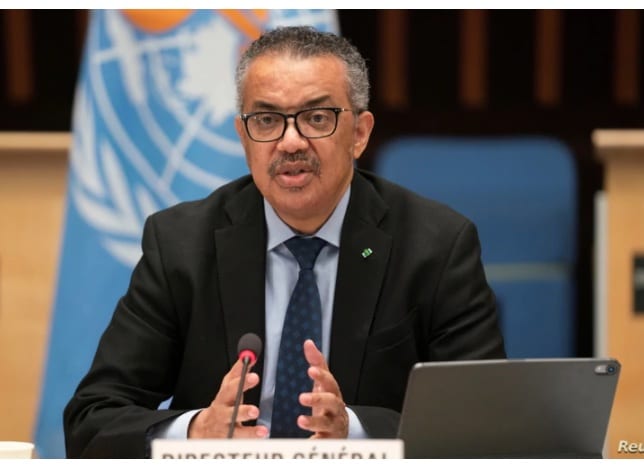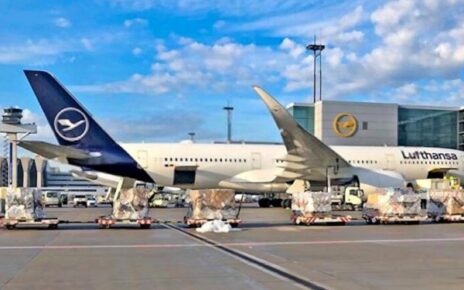Thank you, Your Excellency, and thank you to all Excellencies from the Bridge Group for the invitation to speak to you today.
We very much value your support for multilateralism, strengthening the United Nations and building bridges.
If there’s one thing the pandemic has taught us in the past year, it’s that we are one humanity, and that the only way to confront shared threats is by working together to find shared solutions.
COVID-19 has exposed, exploited and exacerbated our world’s geopolitical fault lines.
This virus thrives on division, but with national unity and global solidarity, it can be defeated.
That is especially true of the global approach to the rollout of vaccines.
Since the beginning of the pandemic, we have known that vaccines would be a vital tool for controlling it.
But we also knew from experience that market forces alone would not deliver the equitable distribution of vaccines.
When HIV emerged 40 years ago, life-saving antiretrovirals developed, but more than a decade passed before the world’s poor got access.
When the H1N1 pandemic erupted 12 years ago, vaccines were developed and approved, but by the time the world’s poor got access, the pandemic was over.
That’s why in April last year we established the Access to COVID-19 Tools Accelerator, which includes the COVAX vaccines pillar, a partnership between Gavi, CEPI, Unicef, WHO and others.
When the history of the pandemic is written, I believe that the ACT Accelerator and COVAX will be one of its standout successes.
This is an unprecedented partnership that will not only the change course of the pandemic, but will also change the way the world responds to future health emergencies.
Two weeks ago, Ghana and Côte d’Ivoire became the first countries to receive doses through COVAX.
In total, COVAX has now delivered more than 28 million doses of vaccine to 32 countries, including some countries represented here today.
This is encouraging progress, but the volume of doses being distributed through COVAX is still relatively small.
The first round of allocations covers between 2 and 3 percent of the population of countries receiving vaccines through COVAX, even as other countries make rapid progress towards vaccinating their entire population within the next few months.
One of our main priorities now is to increase the ambition of COVAX to help all countries end the pandemic. This means urgent action to ramp up production.
This week, WHO and our COVAX partners met with partners from governments and industry to identify bottlenecks in production and discuss how to address them.
We see four ways to do this.
The first and most short-term approach is to connect vaccine manufacturers with other companies who have excess capacity to fill and finish, to speed up production and increase volumes.
The second is bilateral technology transfer, through voluntary licensing from a company that owns the patents on a vaccine to another company who can produce them.
A good example of this approach is AstraZeneca, which has transferred the technology for its vaccine to SKBio in the Republic of Korea and the Serum Institute of India, which is producing AstraZeneca vaccines for COVAX.
The main disadvantage of this approach is the lack of transparency.
The third approach is coordinated technology transfer, through a global mechanism coordinated by WHO.
This provides more transparency, and a more coherent global approach that contributes to regional health security.
And it’s a mechanism that could increase production capacity not only for this pandemic, but for future pandemics, and for vaccines used in routine immunization programmes.
And fourth, many countries with vaccine manufacturing capacity can start producing their own vaccines by waiving intellectual property rights, as proposed by South Africa and India to the World Trade Organization.
The TRIPS Agreement was designed to allow for flexibility on intellectual property rights in the case of emergencies. If now is not a time to use those flexibilities, when is?
In time, there will be enough vaccine for everyone, but for now, vaccines are a limited resource that we must use effectively and strategically.
And the most effective and strategic way to suppress transmission and save lives globally is by vaccinating some people in all countries, rather than all people in some countries.
Ultimately, vaccine equity is simply the right thing to do. We’re one humanity, we’re all equal, and we all deserve equal access to the tools to protect us.
But there are also solid economic and epidemiological reasons for vaccine equity. It’s in every country’s own best interests.
The emergence of highly-transmissible variants demonstrates that we cannot end the pandemic anywhere until we end it everywhere.
The more opportunity the virus has to circulate, the more opportunity it has to change in ways that can make vaccines less effective. We could all end up back at square one.
It also seems increasingly clear that manufacturers will have to adjust to the evolution of COVID-19, taking into account the latest variants for future booster shots.
And countries that are already struggling with vaccine access could find themselves even further behind in terms of access to those booster doses.
WHO is working through our global networks of experts to understand these new variants, including whether they could cause more severe disease, or have an impact on vaccines or diagnostics.
The emergence of these variants also highlights that vaccines complement and do not replace public health measures.
===
Excellencies,
I’d like to leave you with three requests.
First, we seek your continued support for vaccine equity.
Vaccine equity is the best and fastest way to control the pandemic globally, and to reboot the global economy.
At the beginning of the year I called for coordinated action to ensure vaccination begins in all countries within the first 100 days of this year.
Countries that continue with a me-first approach are undermining COVAX and jeopardizing the global recovery.
As a former Minister myself, I understand only too well that every country has an obligation to protect its own people.
And I understand the pressures that governments are under.
We are not asking any country to put its own people at risk. But we can only truly protect all people by suppressing this virus everywhere at the same time.
Vaccine nationalism will only prolong the pandemic, the restrictions needed to contain it, and the human and economic suffering they cause.
Second, we seek your continued support for WHO.
Reviews after SARS, the H1N1 pandemic and the West African Ebola epidemic highlighted shortcomings in global health security, and made numerous recommendations for countries to address those gaps.
Some were implemented; others went unheeded.
The world doesn’t need another plan, another system, another mechanism, another committee or another organization.
It needs to strengthen, implement and finance the systems and organizations it has – including WHO.
And third, we seek your continued support for the centrality of health in international development.
The pandemic has demonstrated that when health is at risk, everything is at risk. But when health is protected and promoted, individuals, families, communities, economies and nations can flourish.
At the UN General Assembly in September 2019, all UN Member States converged to endorse the political declaration on universal health coverage, just a few months before the COVID-19 pandemic started.
The pandemic has only underlined why universal health coverage is so important.
Building strong health systems for universal health coverage requires investments in primary health care, which is the eyes and ears of every health system, and the first line of defense against health emergencies of all kinds, from the personal crisis of a heart attack to an outbreak of a new and deadly virus.
Ultimately, history will not judge us solely by how we ended the pandemic, but what we learned, what we changed, and the future we left our children.
I thank you.




